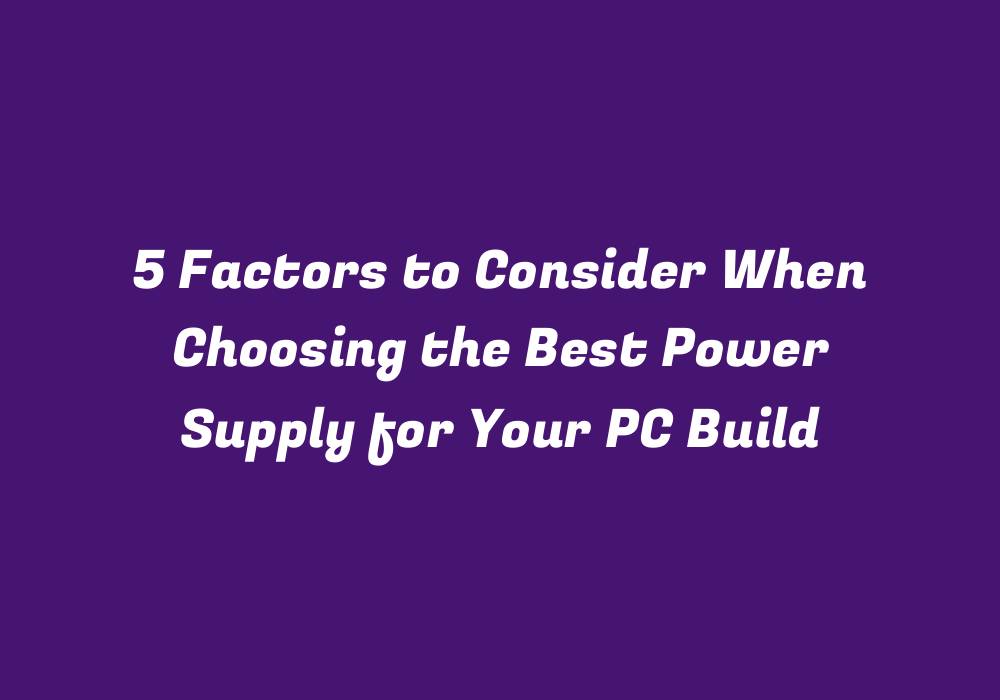Introduction to Power Supplies: Importance and Factors
A PC build can be a significant investment, with various components coming together to form the final system. Among these components, power supply units (PSUs) are crucial for ensuring stable, reliable, and efficient operations of your computer. Choosing the best power supply is more than just selecting one that meets minimum requirements – it requires careful consideration of several factors to guarantee a seamless experience. Here, we explore the five most important aspects to consider when deciding on the perfect PSU for your PC build.
Wattage and System Components
The primary factor to consider is wattage. It’s crucial to select a power supply capable of delivering enough power to all components in your system, taking into account their combined energy consumption. Wattage is represented by the total maximum output of a PSU, which can range from 300-800W or more depending on your needs. Keep in mind that overestimating wattage requirements may not always be necessary, as the power supply efficiency is a key consideration too.
It’s also essential to account for additional components such as gaming peripherals and monitors, which can add further strain on the PSU. Ensure you have an accurate estimate of your total load when determining the appropriate wattage for your build.
Efficiency: Choosing a High-Quality Unit
The efficiency of a power supply determines how well it converts input energy to usable output. Higher efficiency translates into lower heat generation and reduced power losses, ultimately resulting in improved performance and decreased costs associated with cooling requirements. As efficient PSUs generate less waste heat, your system will stay cooler under heavy loads, leading to a more stable and reliable environment for gaming and other intensive tasks.
Seek out power supplies that have an 80 Plus or better certification, such as Titanium, Platinum, Gold, Silver, or Bronze. These standards indicate the PSU’s efficiency levels, with higher ratings offering greater cost-effectiveness in the long run.
Form Factor and Connector Types
Power supplies come in various form factors, each designed to cater to specific system builds based on motherboard size and available space within your case. The most common form factors are ATX (full-sized), Micro-ATX (smaller boards for smaller cases), and Mini-ITX (microcomputer systems). Make sure you know the dimensions of your build, as well as the required connections to determine compatibility between PSUs and motherboards.
Additionally, ensure that the power supply offers the necessary connectors for all components in your system. This may include multiple PCI Express slots, Molex connectors for peripherals, and SATA ports for hard drives and solid-state drives. Considering these factors will prevent potential limitations in future upgrades or expansions of your setup.
Modularity: A Must-Have Feature
Modular power supplies offer the flexibility to choose which components are connected directly to the PSU and which remain attached using cabling outside the unit. This can provide a cleaner appearance inside your case, as well as reduce cable clutter while improving airflow. Modularity also allows for easier maintenance, upgrades, and troubleshooting, should any issues arise with specific components in your build.
While non-modular power supplies may be cheaper, the convenience of a modular design often outweighs the minor cost difference and leads to a more enjoyable user experience in the long run.
Reliability and Warranty
A reliable PSU is crucial for ensuring the stability and longevity of your PC build. Look for power supplies from reputable manufacturers with established track records, as they are more likely to offer high-quality components and robust designs. This will reduce the risk of failure, resulting in lower maintenance costs and a longer lifespan for your system.
Additionally, pay attention to the warranty provided by the manufacturer. A generous warranty can provide peace of mind and allow you to focus on enjoying your PC build without worrying about sudden power supply failures or unexpected malfunctions.
Conclusion
Choosing the best power supply for your PC build requires consideration of several essential factors, such as wattage, efficiency, form factor and connector types, modularity, and reliability/warranty. By taking these aspects into account during your decision-making process, you can ensure a stable and efficient system that will support your computing needs both now and in the future.
